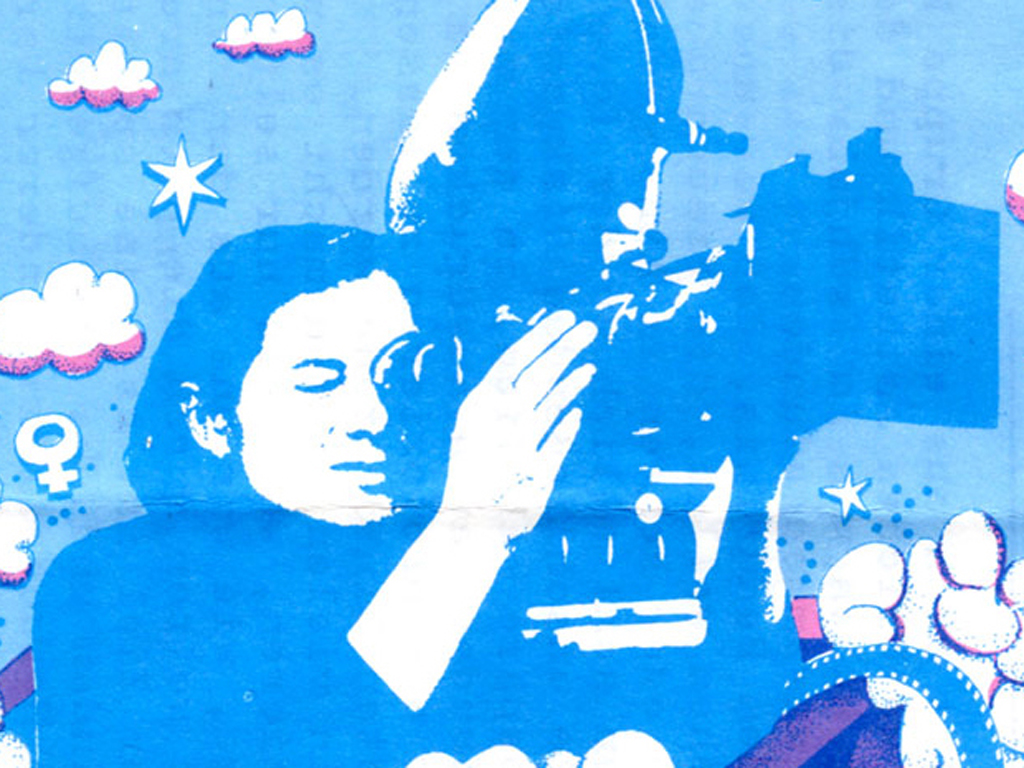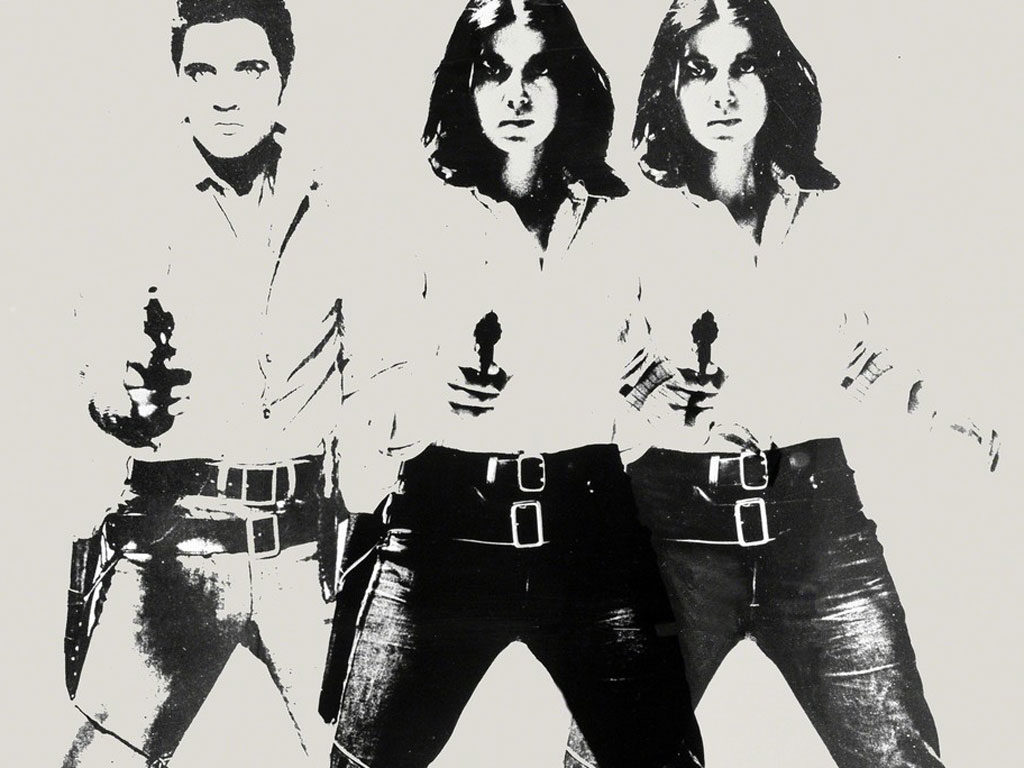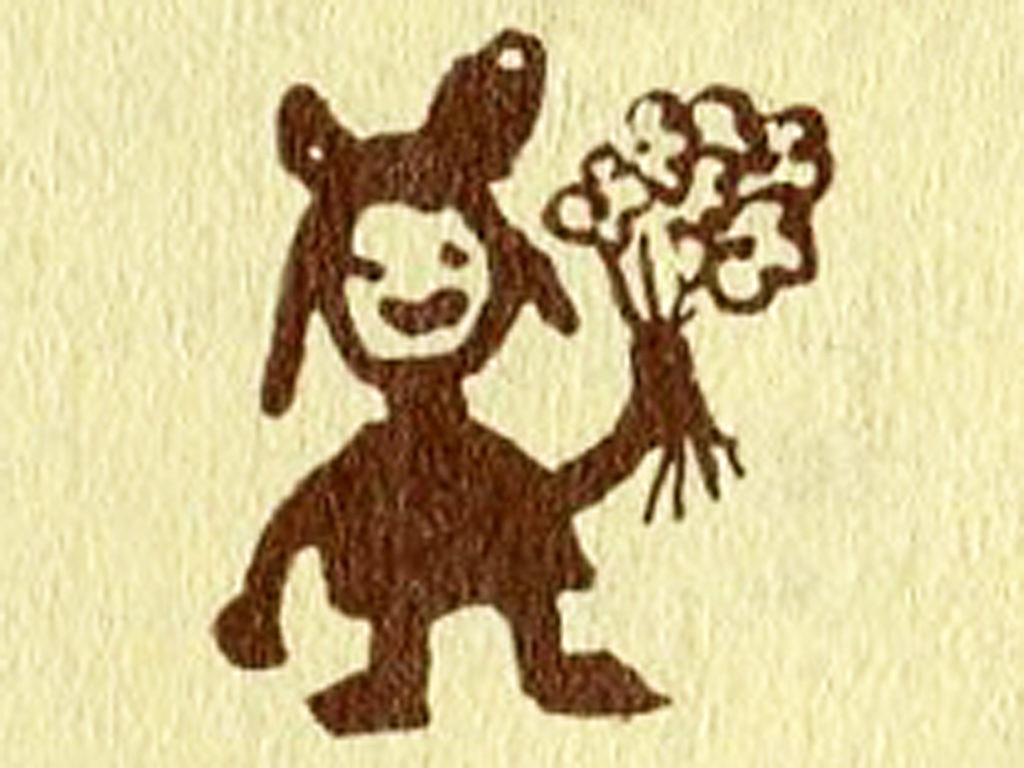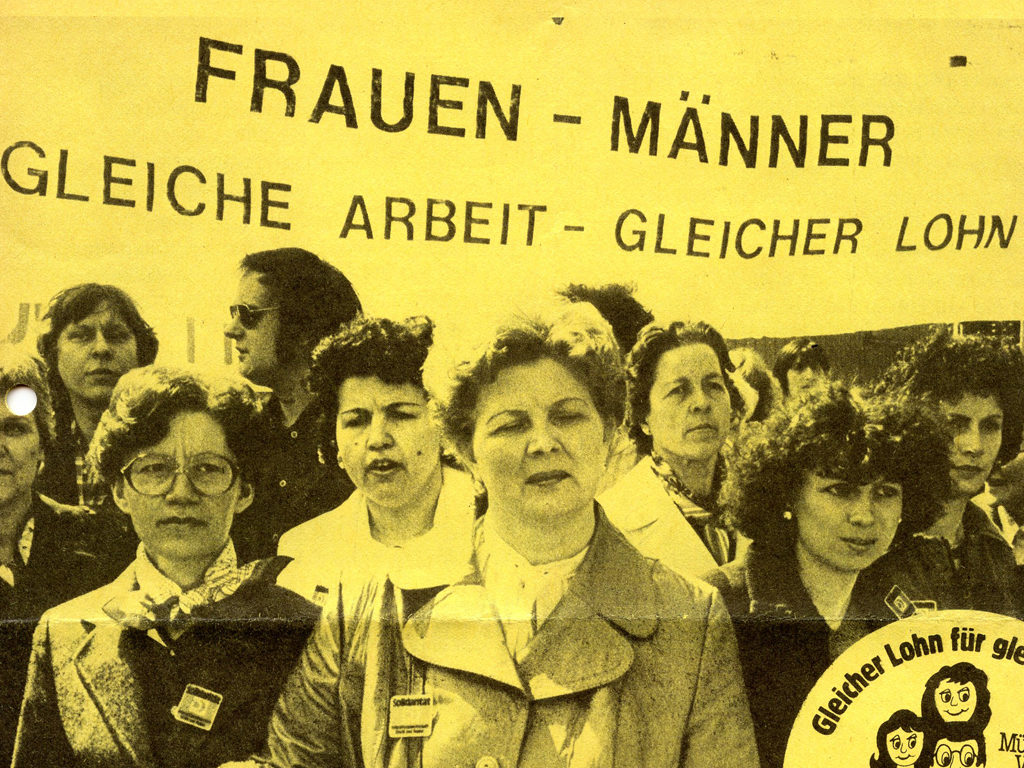As early as the 1960s, about a dozen women directors among them many former actresses (from Věra Chytilová to Mai Zetterling to Agnès Varda) have established themselves as part of a new wave of European Cinema. At the same time, new film academies are founded in Germany1, which allow women direct access to filmmaking. Many young female filmmakers are active in the New Women’s Movement, addressing feminist issues in a variety of film genres. Women’s seminars, festivals and initiatives animate the feminist film politics and the snowball-like distribution.
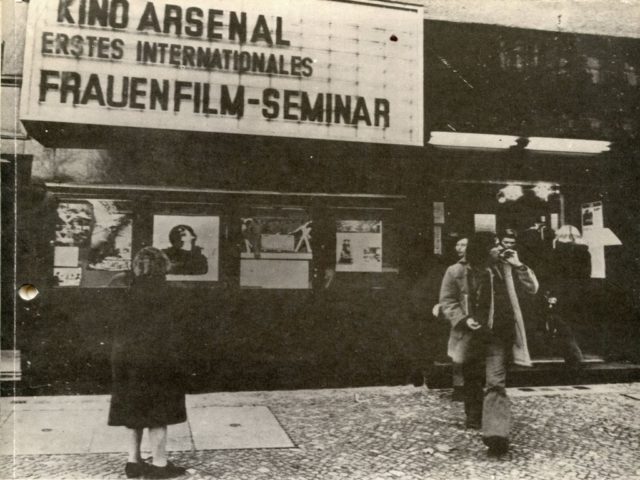
1970: First Female Students at the German Film Academy
Female students and lecturers at the German Film and Television Academy Berlin push through the allocation of one third of all study places to women, so that in the future women can develop and present their own viewpoints. Based on the experience of former graduates, six female students decide to stay among themselves in a women only basic course.2
1971: Short Film Für Frauen 1. Kapitel
The short film Für Frauen 1. Kapitel directed by Cristina Perincioli is one of the first films by women for women. Saleswomen play themselves in the collective fight against wage discrimination.
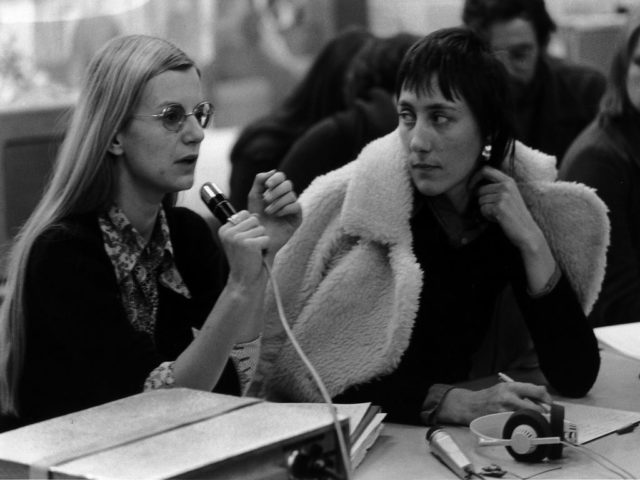
October 1972: The Coop of the Women Filmmakers
Claudia von Alemann, Esther Dayan, Cristina Perincioli, Edna Politi, Helke Sander, Valeska Schöttle and Gisela Tuchtenhagen join forces to form the Coop of the Women Filmmakers. The plan is to produce, support and distribute films dealing with issues of the women’s movement. The distribution of the films will be realised in cooperation with the Berlin cinema ARSENAL.3
15th-18th November 1973: 1. International Women’s Film Seminar
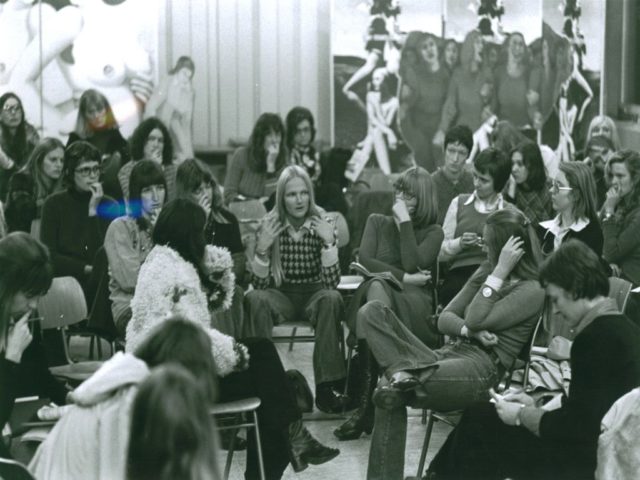
ARSENAL also hosts the 1st International Women’s Film Seminar titled „Documentary and audience films on the situation of women“ organised by Helke Sander and Claudia von Alemann. The four-day film seminar covers the topics of „women in labor disputes“, „women in the representation of the media“, „§218, sexuality, role behavior“ and „women’s movements in Europe and the USA“. Claudia von Alemann concludes: „It was a great success, for four days we showed about 40 films, almost all premieres in West Germany. 300 women and about five men had come together.“4
A month later, the international forum of film avant-garde in Munich organises another women’s film seminar On the Situation of Women to which Alemann, Sander and Erika Runge are invited.5
1974: Frauen und Film
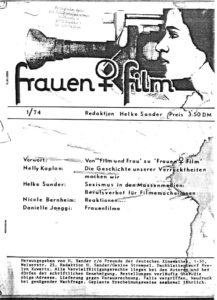
The first feminist film magazine Frauen und Film appears, whose editor is the filmmaker Helke Sander. The program of the journal: „To investigate the mode of action of patriarchal culture in the medium of film, to recognize and define the approaches of a feminist culture, to take up questions and to develop them further“.6 With 68 editions to date, Frauen und Film makes a significant contribution to the development of feminist film theory and the critique of sexism in film. A change of the editorial staff and the move from Berlin to Frankfurt also brings changes in content – the focus is shifted to theory in the tradition of the Frankfurt School.
According to an analysis of the magazine Spiegel, only 5,000 male filmmakers faced 150 female colleagues in 1974.7
23rd-29th April 1975: Female Film Pioneers
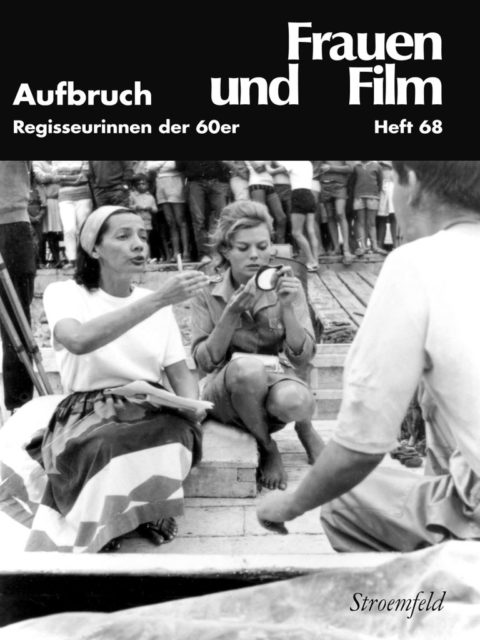
The French are rediscovering female film pioneers: from Alice Guy-Blanché and Germaine Dulac to Leontine Sagan and Mai Zetterling. Nelly Kaplan states as early as 1973: „At the beginning of film history, women stood as pioneers alongside men.
However, this is only mentioned in a few film historical works. Women were quickly eliminated.“8 More than 100 films by women from the period 1931-1975 are shown at the Paris Festival Femmes / Films. Helke Sander responds to the criticism of feminists in the film selection (eg Dorothy Arzner’s Dance, Girl, Dance) with the argument that it is quite interesting for filmmakers to see under what conditions their colleagues could produce films: „For us is Arzner one of the women who paved the way for us. They still had to prove they could ‚do it‘. We just have to push through our issues.“9
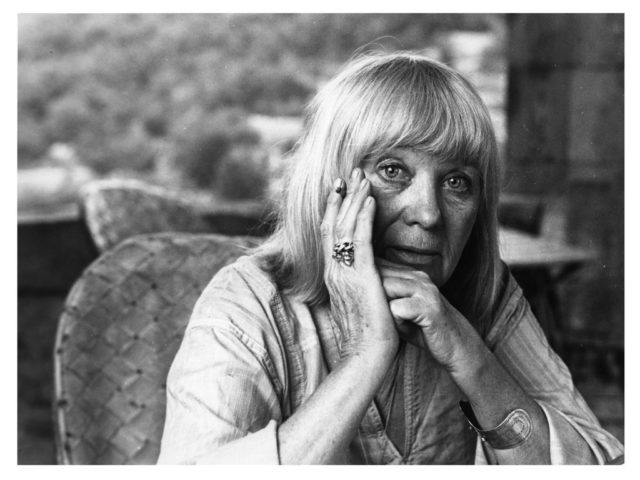
July 7, 1975: Wir haben lange geschwiegen
At the 5th international forum of the young film in Berlin the film Wir haben lange geschwiegen has its premiere. Produced by the Frauenfilmgruppe München, the film narrates central issues of the women’s movement such as housewife’s existence, sexuality and sexual violence.
23-27th July 1975: Symposium on „Women in Cinema“
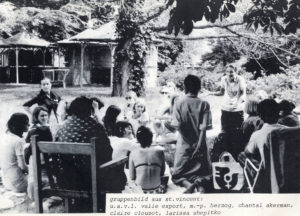
In the Year of the Woman, UNESCO’s Department of Human Rights and Peace organises an international symposium on „Women in Cinema“, held in St. Vincent, Italy. 25 women filmmakers, 10 critics, producers and actresses from 15 countries exchange their experiences. They found the Association Film Women International, in whose statutes the jointly developed demands are taken up.10
1977: Berlin Initiative Frauen im Kino
The initiative Frauen im Kino e.V. is founded in Berlin. Every Thursday films by women for women are shown. The example is followed by other initiatives in other cities (for example: Frauenkino München a year later).11
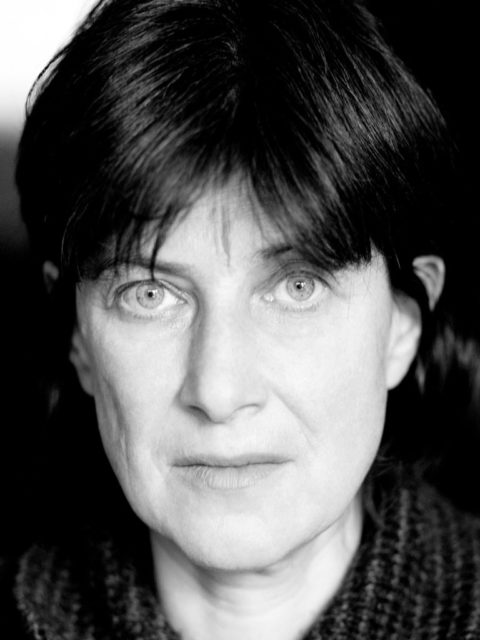
For her film Heinrich, filmmaker Helma Sanders-Brahms and her producer Regina Ziegler receive the Bundesfilmpreis, the Goldene Schale and a bonus of 500,000 DM.12
1978: Feminist Avant-Garde
At the Chicago International Film Festival, Chantal Akerman’s Les rendez-vous d’Anna is awarded the Golden Hugo for Best Film. Saute ma ville (her lesbian coming out) and Jeanne Dielmann are Akerman’s most important works. The latter is considered the most significant example of feminist avant-garde film, of avant-garde at all. „The film with the bureaucratic title (Jeanne Dielman, 23, Quai du Commerce, 1080 Bruxelles) was created in 1975. It became one of the defining films not only of the seventies, but also a turning point in filmmaking.“13
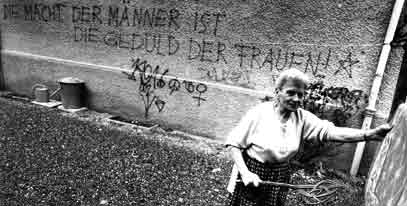
Die Macht der Männer ist die Geduld der Frauen [the power of men is the patience of women] is the title of the film by Cristina Perincioli, which deals with violence in marriage and was developed with women from the first German women’s shelter in Berlin. „Internationally, the film boosted the women’s movement in Germany, Australia, Canada, USA, Switzerland, Austria, Sweden and India.“
1979: Women Assure Their Position in Film Business
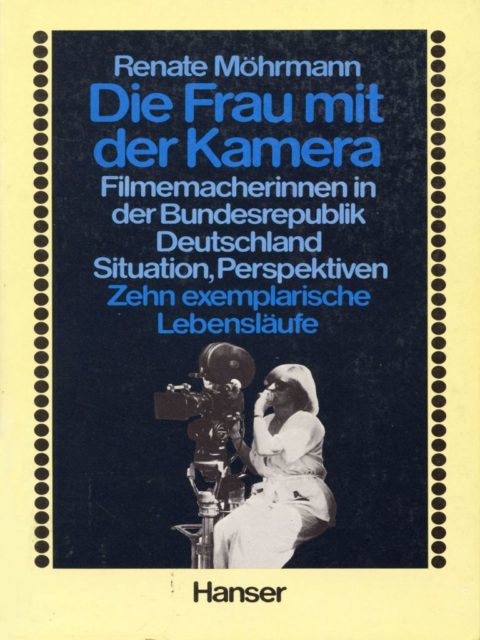
The Verband der Filmarbeiterinnen e.V. [Association of Women Film Workers] is founded in Berlin. Co-founder Ula Stöckl explains in an interview with Renate Möhrmann, that the intention of the association includes more than the demand of 50% of all production money: „Filming is open to all film-interested women and it offers chances of training to become a filmmaker with the support of other women and their experiences.“14
In the fall, students of the Academy of Fine Arts in Hamburg open the Frauenmedienladen Bildwechsel – an autonomous cultural and media center for women whose concept includes women’s cinema, a video rental and a film archive. The archive in Hamburg still exists, and a Netzwerk von „künstler_innen und sympatisant_innen“ [network of „artists and sympathizers“] has developed under the umbrella organization Bildwechsel.
Hildegard Westbeld launches Chaos Film, the first German women’s film distributor, but it will only exist for two years.
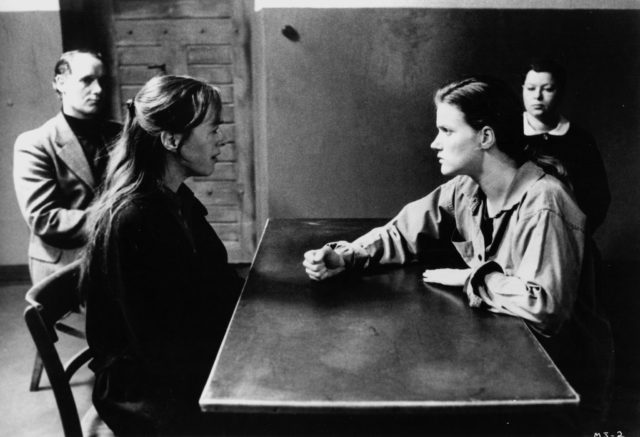
In Sceaux, on the southern edge of Paris, the first women’s film festival takes place founded by Jackie Buet and Elisabeth Tréhard. The intention is to show the quality of the cinematic works of women, which often remain invisible at the big festivals. The International Festival de Films de Femmes still exists until today, since 1985 it is held in Créteil.
1980: Die Frau mit der Kamera
Renate Möhrmann’s short biographies of female filmmakers in Germany are published by Hanser Verlag in Munich titled Die Frau mit Kamera.15
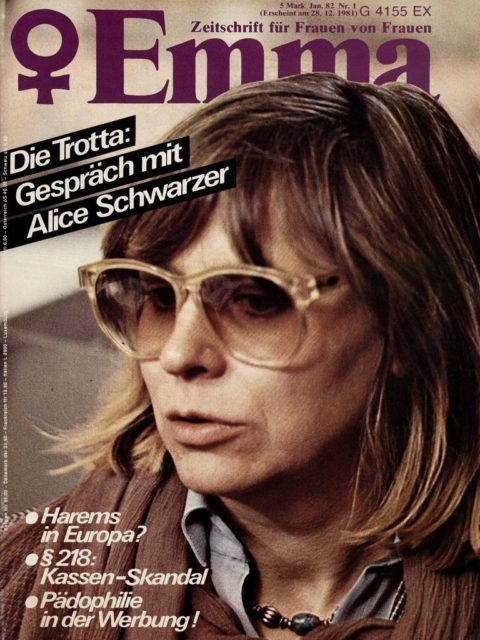
1981: Margarethe von Trottas Success
Actress Margarethe von Trotta had made films together with her husband Volker Schlöndorff at the beginning of the 1970s (Strohfeuer, 1972, Die verlorene Ehre der Katharina Blum, 1975). On September 25, 1981, her first own film is released in German cinemas: Die Bleierne Zeit. For the drama, based on the biography of the Ensslin sisters, Trotta is awarded the Golden Lion at the Venice Film Festival as the first woman filmmaker. Although this makes her the internationally most famous female German director, she still faces difficulties producing her films. When asked about the cliché „Frauenfilm“, Trotta answers in a conversation with Alice Schwarzer: „I hate being pinned down to a certain genre or being pushed into the kitchen corner. In terms of budget, however, we women are still doing housewife movies. But the reception is gradually getting fairer, people are trying less to reduce us to our womanhood.“16
![FrauenFilmHandbuch [Frauenfilmhandbuch] : made in BRD + WB nach 1945 (1983). - Verband für Filmarbeiterinnen e.V. [Hrsg.] - Berlin: Selbstverlag, S.5 (FMT-Signatur: KU.15.001). FrauenFilmHandbuch [Frauenfilmhandbuch] : made in BRD + WB nach 1945 (1983). - Verband für Filmarbeiterinnen e.V. [Hrsg.] - Berlin: Selbstverlag, S.5 (FMT-Signatur: KU.15.001).](http://frauenmediaturm.de/wp-content/uploads/2018/06/Frauen_Film_Handbuch-640x421.jpg)
1983: FrauenFilmHandbuch
The Verband der Filmarbeiterinnen e.V. [Association of Women Film Workers] in Berlin publishes the FrauenFilmHandbuch: made in BRD + WB after 1945 in self-publishing. The comprehensive reference book lists 476 German women directors. The editors describe it as a pioneer work, which accentuates „how much the work of women filmmakers has so far been suppressed in publications, how little the public and specialists know about it.“17
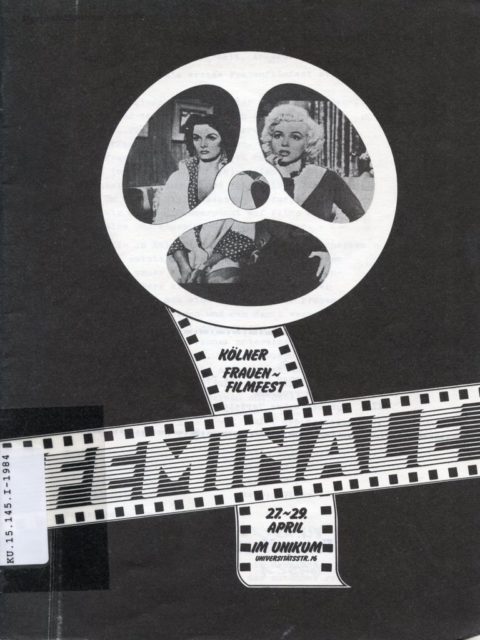
27th-29th April 1984: Feminale-Festival in Cologne
Eight students of film and theater studies at the University of Cologne put on the first Cologne women’s film festival Feminale after one year of preparation time. Supported by funds from the state of North Rhine-Westphalia and organised by the autonomous women’s department of the University of Cologne, women’s films from NRW are shown in the AStA-Café UNIKUM and a supporting program with lectures and a special lesbian film program is offered.18
January 1987: New Law, No Equality
A new film promotion law comes into force. The Verband der Filmarbeiterinnen’s demand for equal representation of all committees is not taken into account. The Association starts preparing an appeal to the Federal Constitutional Court, citing the principle of equality (Article 3, GG), which will be presented in December 1987(taz, 9.1.1988, Filmfrauen ziehen vors Gericht).
29.4. – 3.5.1987: FrauenFilmFestival femme totale im Revier
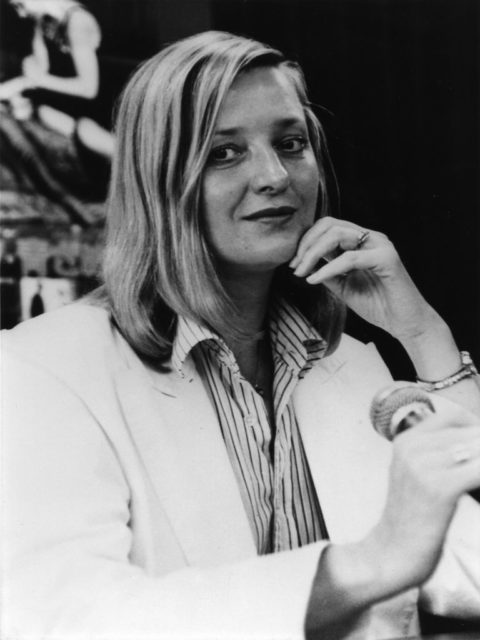
The first FrauenFilmFestival femme totale im Revier in Dortmund starts with an homage to Helma Sanders-Brahms. The project group’s intention: „We are asking for feminist film theory on cinema, on films, we are questioning the conditions, we are interested in the ‚view into the world‘ from the point of view of women, their aesthetic partisanship, their topics, their (feminist?) viewpoint.“19
1988: Fight of the Women Film Workers
The constitutional court complaint of the Women Film Workers is rejected. The First Senate of the Federal Constitutional Court justifies the decision as follows: „The abstract risk of discriminatory awarding of funds, which is based on the factual composition of the funding bodies, does not provide legal grounds for individual complaints of fundamental rights violations.“
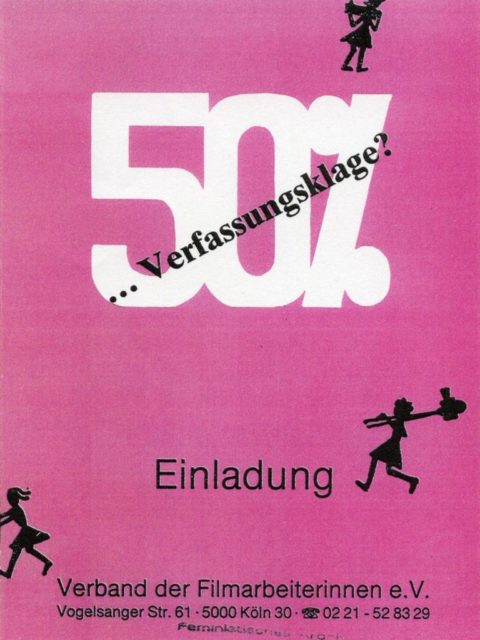
Lawyer Helga Wullweber, who represented the Association of Women Film Workers legally, concludes from this in a press release dated June 23, 1988, that the First Senate obviously does not assess „the dominance of men and the discrimination of women in the field of film promotion as serious violation of the gender equality principle“. The board of the Association of Film Workers announces a lawsuit at the European Court of Justice and draws attention to the fact that the rejection also includes a basic statement on the responsibility of the state for compliance with the principle of equality.”20
July 1988: International Exchange
At the Feminale in Cologne, the Verband der Filmarbeiterinnen organises a two-day symposium with around 80 European film and television women for an international exchange of experience. Federal Minister of Women Rita Süssmuth justifies her support with concern about „the tendency to neglect women in designing the new communication structures.“21
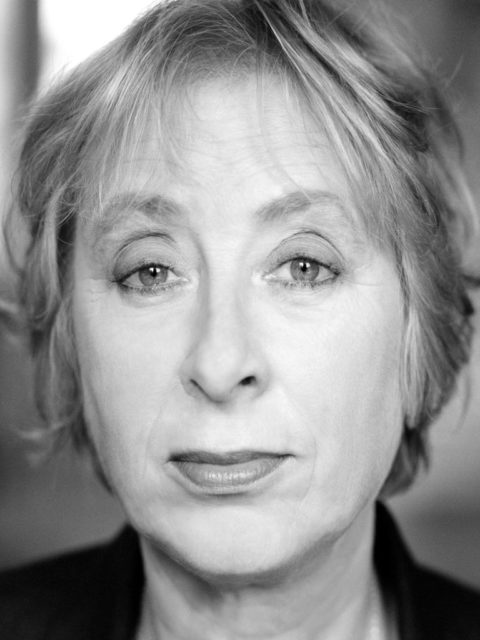
What happens next? And the Oscar Goes to…
The Dutch Marleen Gorris (Antonia’s World) and the German Caroline Link (Nowhere in Africa) are the first women filmmakers to receive an Oscar for Best Foreign Language Film in 1996 and 2003. More
In 2006 the Cologne Feminale (the oldest women ’s film festival in Germany) and Dortmund‘ s femme totale, the largest women ’s film festival in Germany, merged and became the International Women‘ s Film Festival (IFF) Dortmund|Cologne with anually alternating venues.
In 2014, 330 German women filmmakers launch a ProQuote campaign calling for a 50% proportion of women to be awarded television and film directorships within a period of ten years.22
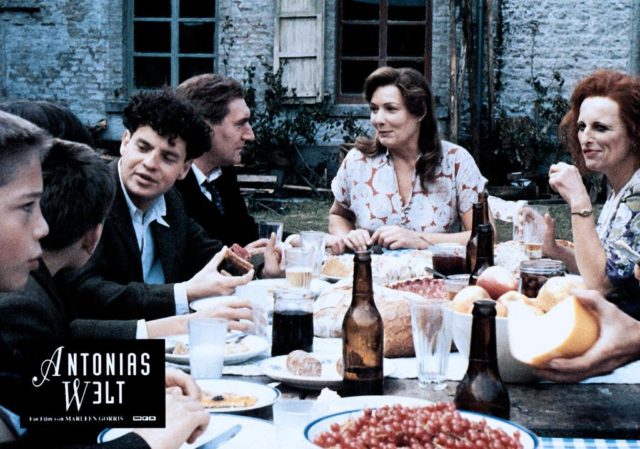
According to a study by the Directors Guild of America (DGA) of 2015, only 6.4% of filmmakers in the period under review (2013/2014) were women and only 3% of them were directors of high-budget films.
Findings of the Gender Report of the University of Rostock show, that only every fifth German film (22%) is directed by a woman. The study also shows that women’s films are awarded more often, even though they are based on significantly less budget.
During the Berlinale 2016, the Bundesverband Regie e.V. presents the Diversity Report Gender and Age Structure in the direction of fictional TV works and films for the year 2014 and concludes that the proportion of women in directing is stagnating. In German cinematographic films, the proportion of women directors has even declined compared to the previous year – from 22% to 19%.
References
1 Among these are: the Institut für Filmgestaltung Ulm (1962), the Deutsche Film- und Fernsehakademie Berlin (1966) und die Hochschule für Fernsehen und Film in München (1967). See: Fischetti, Renate (1992): Das neue Kino : Acht Porträts von deutschen Regisseurinnen. - Dülmen-Hiddingsel [i.a.] : tende, S. 26. (FMT-Shelf Mark: KU.15.012).
2 Informationsstand des Verbandes der Filmarbeiterinnen e.V. in der Akademie der Künste (1980). Verband der Filmarbeiterinnen/Arbeitsgruppe Berlinale [ed.]. - Berlin : Sofortdruck, 1980, S.2., see Pressedokumentation: Film III (FMT-Shelf Mark: PD.KU.15.03, Kapitel 3, Interessenvertretung der Filmemacherinnen).
3 Leaflet of the COOP der Filmerinnen (1972), see Pressedokumentation: Film III (FMT-Shelf Mark: PD.KU.15.03, Kapitel 2, Frauenfilmverleih).
4 Wie haben Sie das gemacht? : Aufzeichnungen zu Frauen und Filmen (2014). - Lenssen, Claudia [Hrsg.] ; Schoeller-Boujou, Bettina [ed.]. - Marburg : Schüren, S. 37 (FMT-Shelf Mark: KU.15.228).
5 Alemann, Claudia von ; Sander, Helke (1974): Zur Situation der Frau : Modellseminar, Film- und Literaturverzeichnis. - Freunde der Deutschen Kinemathek [ed.] ; Evangelische Konferenz für Kommunikation
6 Hiller, Eva ; Sander, Helke ; Strempel, Gesine (1975): Das Programm für Frauen und Film. - In: Frauen und Film, no. 6, p.3. (FMT-Shelf Mark: Z-F006:1975-6).
7 Besonderer Blick (1974). - In: Der Spiegel, 22.04.1974, p.186. - Verfügbar unter: Der Spiegel http://www.spiegel.de/spiegel/print/d-41726456.html
8 See: Sander, Helke ; Schlesier, Renate (Renée) ; Strempel, Gesine (1974): Vorwort der Redaktion : Von "Film und Frau" zu "Frauen und Film". - In: Frauen und Film, Nr. 1, S.6 (FMT-Shelf Mark: Z-F006:1974-1).
9 Sander, Helke (1975): Femmes / Films in Paris vom 23.-29. April 1975. - In: Frauen und Film, Nr. 5, S.48 ff. (FMT-Shelf Mark: Z-F006:1975-5).
10 Alemann, Claudia ; Sander, Helke (1975): Filmemacherinnen in St. Vincent. - In: Frauen und Film, no. 6, pp.18ff. (FMT-Shelf Mark: Z-F006:1975-6).
11 Lueken, Verena (2015): Sie gab dem Publikum Freiheit. - In: FAZ, 06.10.2015. - Frankfurter Allgemeine Zeitung http://www.faz.net/aktuell/feuilleton/kino/zum-tod-der-regisseurin-chantal-akerman-13842402.html
12 Informationsstand des Verbandes der Filmarbeiterinnen e.V. in der Akademie der Künste (1980). Verband der Filmarbeiterinnen/Arbeitsgruppe Berlinale [ed.]. - Berlin : Sofortdruck, 1980, p.5, see Pressedokumentation: Film III (FMT-Shelf Mark: PD.KU.15.03, Chapter 3 Interessenvertretung der Filmemacherinnen).
13 Möhrmann, Renate (1980): Die Frau mit der Kamera : Filmemacherinnen in der Bundesrepublik Deutschland ; Situation, Perspektiven ; 10 exemplarische Lebensläufe. - München: Hanser, p. 15 (FMT-Shelf Mark: KU.15.007).
14 Ibida, p. 56.
15 Möhrmann, Renate (1980): Die Frau mit der Kamera : Filmemacherinnen in der Bundesrepublik Deutschland ; Situationen, Perspektiven ; 10 exemplarische Lebensläufe. - München: Hanser (FMT-Shelf Mark: KU.15.007).
16 Schwarzer, Alice ; Trotta, Margarethe von (1982): Das bißchen Leben, das ich brauche. - In: EMMA, issue 1, pp.10-18.
17 FrauenFilmHandbuch [Frauenfilmhandbuch] : made in BRD + WB nach 1945 (1983). - Verband für Filmarbeiterinnen e.V. [ed.] - Berlin: Selbstverlag, p.5 (FMT-Shelf Mark: KU.15.001).
18 Baron, Esther ; Dötig, Angelika [i.a.] (1984): Feminale : Dokumentation des 1. Kölner Frauenfilmfestes (27.-29. April 1984). - Köln: Selbstverlag. (FMT-Shelf Mark: KU.15.145-1984)
19 See: FrauenFilmFestival femme totale im Revier, 29.4.-3.5.1987 (1987). - Femme Totale
20 Dokumentation zur Verfassungsklage des Verbands der Filmarbeiterinnen (1988). - In: Frauen und Film, issue 44/45, Oktober 1988, pp. 168-171 (FMT-Shelf Mark: Z-F006:1988-44/45).
21 Hermanns, Angelina (1988): Im Patriarchenclan der Medienzaren ohne Chancen? - In: Frankfurter Rundschau, 14.07.1988, see Pressedokumentation: Film III (FMT-Shelf Mark: PD.KU.15.03).
22 See: Filmemacherinnen: Action! (2014). - EMMAonline, http://www.emma.de/artikel/filmemacherinnen-action-318049
Date of the last linkcheck: 31.08.2017
Selective Bibliography
Documents online
Recommendations
Möhrmann, Renate (1980): Die Frau mit der Kamera. - München u.a.: Carl Hanser Verlag. (FMT-Signatur: KU.15.007)
Dokumentation zur Verfassungsklage des Verbands der Filmarbeiterinnen (1988). - In: Frauen und Film, Nr. 44/45, pp. 168-171. (FMT-Signatur: Z-F006:1988-44/45)
Lenssen, Claudia ; Schoeller-Boujo, Bettina (2014): Wie haben Sie das gemacht? - Aufzeichnungen zu Frauen und Filmen - Marburg : Schüren. (FMT-Signatur: KU.15.228)
FMT Press Documentation
Press Documentation on the Topic of Female Filmmakers: PDF-Download
The FMT press documentation is thematically structured and indexed. It comprises articles of the general public press, feminist press and other documents, such as leaflets and archival documents.
Selected FMT-Sources (lists)
FMT selected literature female film makers: PDF-Download
EMMA articles female film makers: PDF-Download
Related Topics
The Female Artist: A Feminist View on Art and Photography
The Female Artist: A Feminist View on Art and Photography
In the 19070ies feminist artists challenged the male-dominated art world - and fought for the visibility of female artists. › mehr
Female Makers: Pioneering Feminist Projects in Germany
Female Makers: Pioneering Feminist Projects in Germany
"We claim for an all-women room!" That was the slogan of the autonomous women's projects founded in the beginning of the 1970s. › mehr
Women Who Work: Housework and Claim for Equal Pay
Women Who Work: Housework and Claim for Equal Pay
When the women’s movement started, housework was still by law a woman’s job. Feminists fought successfully for the abolition of this law. › mehr


